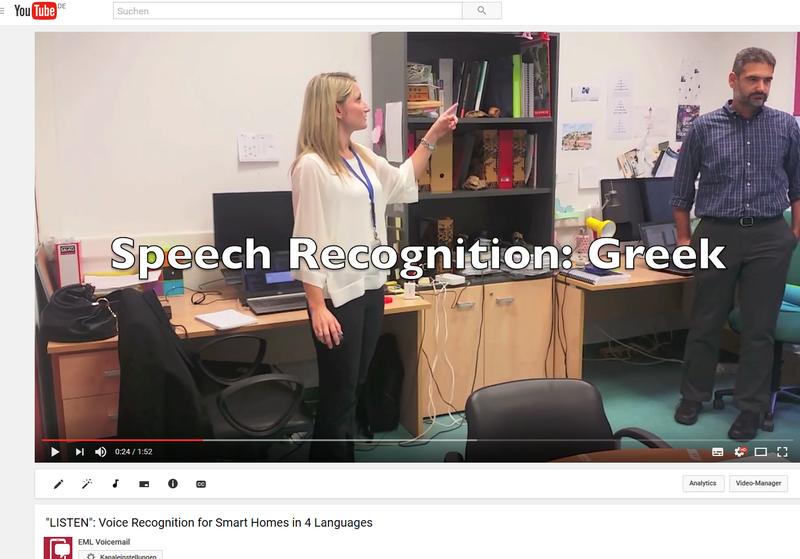

Voice recognition in real-time and in 4 languages: the EU project "LISTEN""
Video: EML/LISTEN
Wouldn´t it be convenient to control heating or cooling, lighting, and media anywhere in your home by just using your voice, without any device in your hand? For the elderly and people with disabilities, it would be even more than that: It can provide assistive control of important everyday activities and even save lives, in case of emergencies.
To develop such a novel smart home functionality, speech technology and signal processing experts from Germany, Greece, and Italy collaborate in the EU project “LISTEN” – “Hands-free Voice-enabled Interface to Web Applications for Smart Home Environments”. They are designing a system enabling robust hands-free large-vocabulary voice-based access to Internet applications in smart homes using microphone array networks. http://www.listen-project.eu/
The partners: the Foundation for Research and Technology Hellas (FORTH), Greece (project coordinator), EML European Media Laboratory GmbH, Germany, the RWTH Aachen University, Germany, and Cedat 85, Italy.
“LISTEN” is part of the Marie Skłodowska-Curie Research and Innovation Staff Exchange (RISE) program, in the HORIZON 2020 framework. The four-year project started on June 1, 2015.
In the mid-term project review meeting in Heraklion, Greece, the project partners demonstrated the system in four languages (English, German, Greek, and Italian). To this occasion, the partners already showed important functions of the project, like the multiple language speech recognition and the use of a microphone array, which is a matchbox-size unit with 8 microphones. The EU project officer Alina Suhetzki experienced “LISTEN” by herself. Speaking her commands in English, she switched the lights on and off in a blink. “This was an impressive demonstration”, she said. “A small and smart system that works in real-time with four languages and can also be adapted to further languages.” (See video of the project demonstration at the review meeting in Heraklion https://youtu.be/W_0lh4qk9BI).
“LISTEN” is part of the Marie Sklodowska-Curie Research and Innovation Staff Exchange (RISE) program, in the HORIZON 2020 framework. The four-year project started on June 1, 2015. The partners are: the Foundation for Research and Technology Hellas (FORTH), Greece (project coordinator), the Heidelberg-based EML European Media Laboratory GmbH, Germany, the RWTH Aachen University, Germany, and Cedat 85, Italy.
One goal of the project is to push the boundaries of the current state-of-the-art through basic research activities. Researchers from the partners RWTH Aachen and FORTH, together with colleagues from the University of Paderborn, participated in the 4th CHIME Speech Separation and Recognition Challenge and presented their results at the “International Workshop on Speech Processing in Everyday Environments” in San Francisco in September. The team scored 2nd place in all three different tracks of the challenge, i.e. using 1, 2, or 6 microphones respectively for capturing the speech signals, with 13, 14, and 15 participating teams respectively “We are very proud about the results that clearly indicate the quality of our team, and the potential of LISTEN to develop innovative research and attract the attention of the research community,” says Prof. Athanasios Mouchtaris, LISTEN project coordinator, Associate Professor of Computer Science at the University of Crete and Affiliated Researcher at FORTH.
http://spandh.dcs.shef.ac.uk/chime_challenge/overview.html.
The “LISTEN” partners are seeking to bridge the gap between the acoustic sensors and the automatic speech recognition research communities. They bring in a lot of expertise from both sides, thus strengthening interdisciplinary research and the exchange of knowledge between universities and companies on a European level.
The Foundation for Research and Technology Hellas (FORTH), Heraklion, Greece, serves as project coordinator. They bring to the project their expertise in acoustic sensor networks and microphone array signal processing. The Heidelberg-based EML European Media Laboratory GmbH (Germany) provides their speech recognition system and refine their tools for the project. The RWTH Aachen University (Germany) speech recognition group brings in its long-time experience and newest technologies in core speech recognition research. Cedat 85 (Italy) brings to “LISTEN” its industrial expertise on building applications and systems that incorporate speech recognition technologies.
For further information, please contact
Dr. Peter Saueressig
Public Relations
EML European Media Laboratory GmbH
Mathematikon
Berliner Str. 45
D-69120 Heidelberg
Phone: +49-6221-533245
E-mail: saueressig@eml.org
Twitter: @EMLVoice
FORTH (Greece) is one of the largest research centers in Greece with well-organized facilities, highly-skilled personnel and a reputation as a top-level research foundation worldwide. In LISTEN, FORTH participates through its Institute of Computer Science (ICS), and more specifically the Signal Processing Laboratory (SPL) which has significant expertise on acoustic sensor networks, sound source localization and beam forming, audio signal modelling and coding, distributed processing, and communications. http://www.ics.forth.gr/
The RWTH Aachen University (Germany) speech recognition group is one of the most prestigious in this area worldwide, with decades of experience in core speech recognition research, including statistical model development, natural language processing, and applications development. http://www-i6.informatik.rwth-aachen.de/
The EML European Media Laboratory GmbH (Germany) is a private IT enterprise established by Klaus Tschira, one of the founders of the SAP AG software company. In accordance with its motto “Experience IT – Intuitive Technology” EML is successfully pursuing research and development in the fields of human-computer interaction and automatic speech processing. http://www.eml.org
Cedat85 (Italy) has a long history of industrial expertise on building specific applications of speech recognition systems, including system integration and evaluation of speech communication systems. http://www.cedat85.com
https://youtu.be/W_0lh4qk9BI video of the project demonstration at the review meeting in Heraklion












